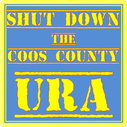
The city officials are making the argument that the city should not have to ask the voters permission to sell Revenue Bonds because this type of bond has existing revenue sources to repay the debt, so it does not require the enactment of a new tax. However, the city has to repay the debt with public money, so it is a tax nonetheless.
The voters in 1996 chose to establish voter approval for the sale of certain bonds because the people knew the local politicians would continue to spend public money on wasteful projects with little regard for the concerns of the citizens.
The most disturbing thing about this agenda item is that the city recorder has already filled out and predated the SEL802 document that the city has to submit to the county clerk for a ballot measure. It is almost as if the city officials already know how the council and mayor will vote before the meeting has occurred….Rob T.
February 20, 2018 - 7:00 PM
Council Chambers - 500 Central Avenue, Coos Bay, OR
Those changes will affect these sections of the city charter:
(1) Section 4.1 Meeting requirements of the Council;
(2) Section 9.11 Funds for Police Officers and Firefighters;
(3) Section 9.12 Sales of Bonds and Warrants.
|
|
|
| ||||||||
On February 18, 2017, the Council held a work session to discuss priorities for 2017-2019. The work session was facilitated by consultants from Solid Ground Consulting. Based on a consensus of the Council, priorities were categorized into five areas: (1) Wastewater; (2) Street Maintenance; (3) Library facility; (4) Economic Development; and (5) City Charter. On April 4, 2017, the Council approved the attached goals which included possible amendments to the City Charter.
- Section 4.1 of the Charter requires in part that the "...Council shall hold a regular meeting at least twice each month..." Currently the Council meets and has traditionally met on the 1st and 3rd Tuesdays evening of each month for their "regular meetings." There have been times when such regular meetings were not necessary and where the business of the Council could have been conducted during one monthly meeting rather than in two. The following is the proposed amended Section 4.1 language in its entirety: Section 4.1 Meetings. The Council shall hold regular meetings as the business of the City requires, at a time and at a place in the City which it designates and may adopt rules for the government of its members and proceedings. The mayor, manager, or three members of the Council may, by giving notice to all members of the Council then in the City, call a special meeting of the Council.
- The City Charter was amended by the voters in 1988 by adding Section 9.11 Funds for Police Officer and Firefighters. Section 9.11 requires mandatory minimum staffing for public safety personnel. Under Oregon's current taxing structure the City is unable to and has been unable for more than a decade to fund all of the required positions. Section 9.11 was deemed unconstitutional in 2003. As the language is not enforceable and unattainable, it should be deleted from the City Charter.
- The Charter was amended in 1996 by adding Section 9.12 of the Charter precludes the City from the selling of all bonds or warrant without an approval of the voters. The intent of the Charter amendment was to stop the Coos Bay Urban Renewal Agency from issuing bonds to undertake for a library expansion project. While the voters approved the ballot measure which precluded the City from issuing bonds and warrants, it was not and is not legally binding on the Coos Bay Urban Renewal Agency which under Oregon law is a separate corporate political entity.
For many borrowings, an Oregon city can choose to do any of the following kinds of borrowings:
- GENERAL OBLIGATION BONDS pledge the "full faith and credit" of the city, and permit the city to levy an additional property tax that is sufficient to pay the bonds. Because these bonds are secured by this additional property tax, voter approval is required. General obligation bonds are usually the most secure form of borrowing available to a city, and therefore usually have the lowest cost.
- REVENUE BONDS are secured by a pledge of a specific revenue source or tax source, typically do not require voter approval and are usually subject to referral. The interest rates and other costs of revenue bonds are usually higher than for general obligation bonds, and depend greatly on the type of revenues that are pledged to pay the bonds.
- Local improvement district or "Bancroft" bonds are bonds that are issued to finance the costs of local improvements that are assessed against neighboring property. Assessed property owners are entitled to pay the assessment, with interest, over at least ten years. Cities use those payments to pay the local improvement district bonds.
- CERTIFICATES OF PARTICIPATION (sometimes referred to as COPs) on which annual debt service payments are subject to annual appropriation. Borrowings that are subject to appropriation usually have higher interest rates than borrowings that are not. Recent changes in Oregon law allow most cities to do general fund obligations, and certificates of participation have become relatively uncommon.
- GENERAL FUND OBLIGATIONS, OR LIMITED TAX OBLIGATIONS, which are similar to COPs but are a binding obligation payable from all resources of the general fund rather than to annual appropriation. Some city charters do not permit this kind of borrowing.
- LOAN AGREEMENTS are often used when a city borrows from a bank.
Since the inclusion of Section 9.12, the City has secured funding (loans) from federal and state agencies, from banks, and by the sale of bonds (approved by the voters for the building and equipping of the Fire Station). Given that the time process involved in securing voter approval for revenue bonds combined with the reality that the financial market is in constant flux, the City has chosen not to avail itself to this funding possibility. As is stated above, revenue bonds do not typically require approval of the voters as cities have existing revenue sources to repay the debt (doesn't require enactment of a new tax). While revenue bonds generally don't require voter approval, they are generally subject to referral to the voters through the referral process.
As Section 9.12, as currently worded limits financing options, staff recommends amending the language. Financing options, such as GO Bonds and other bonds which require the implementation of an additional tax should require voter approval. Amending the language would provide the City greater flexibility, without the ability to impose additional taxes, for financing the business of the City.
In addition, the City Attorney had reviewed the current City Charter and is suggesting that the Council consider additional amendments which would remove langue referencing consolidation and consolidation continuances.
Section 2.4 Utilities. The City, acting by and through its Council, is authorized and empowered to acquire, construct, purchase, own, lease, operate and maintain, within, without, or partly within and without the corporate limits of the City, public utilities and other public utilities and other public enterprises and properties which may be deemed by the Council to be in the public interest, including, but not limited to, airport, roadway, dock, wharf, sewer, and water system facilities; and the Council may, by ordinance, authorize the issuance and sale of self-liquidating revenue bonds and self-liquidating notes or contracts payable only from the pledged revenues of public utilities, enterprises and properties for the acquisition, purchase, construction, reconstruction, improvement, extension or repair of any such utility, enterprise or property or any part thereof; provided that such obligations, and any part thereof, shall not be payable from taxes or general fund revenues and shall not be deemed general obligations of the City unless specifically authorized at election of the legal voters of the City, nor shall such self-liquidating obligations be debts of the City within the meaning of any constitutional, statutory or charter limitations.
Coos Bay Pays Around $406,000 to Repair Mingus Park Pool
Coos County Public Hearing on Extending the Urban Renewal Tax Debt Dec. 13, 2017
The Excesses of Tax-Increment Financing & Urban Renewal
Coos Bay URA Spends $300,000 on North-South Gateway While Streets Deteriorate
Coos Bay Street Action Plan Open House Thursday, June 8, 2017, 5:30pm
Coos Bay Legally Steals from Average Citizens to Decorate a Private Business
Coos Bay Taking from the Poor to Give to the Privileged Using Urban Renewal
Coos Bay Gives $97,000 of Public Money to the Local Drama Club
Coos Bay Redistributing Money to Owners of Historical Places
Coos Bay Giving Away Public Money to a Private Business Using Urban Renewal
CATO Policy Analysis #676 ~ The Case Against Tax-Increment Financing
Public Comment Due BY December 1, 2017 on Coos County Urban Renewal Agency
The Continuing Saga of the Coos County Urban Renewal Agency
Coos County Board of Commissioners FINAL VOTE on Extending the URA Debt
Information on the Campaign to Shut Down the North Bay URA
Coos County Proposed Ordinance Adopting North Bay UR Plan ~ FOREVER
Coos County Commissioners Hearing on Extending the Debt of the North Bay URA
Cribbins & Sweet Utilize Voter Suppression on Urban Renewal Extension
PERS Task Force Recommends Exempting School Districts from Urban Renewal
List of Coos Bay’s Urban Renewal Expenditures from 2006 - 2012
LTE ~ Coos Bay Urban Renewal Giving Away Public Assets Paid for by The Public
#CoosBay Urban Renewal Monies Siphoned from Public Basic Services
Port of #CoosBay Blowing Through Your Tax Dollars Like Drunken Sailors
Commissioners Campaign Contributors are Champions of Corporate Welfare









 RSS Feed
RSS Feed
